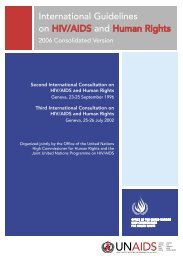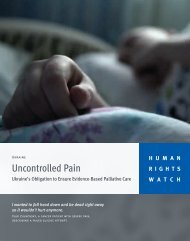INTERIGHTS Bulletin
INTERIGHTS Bulletin
INTERIGHTS Bulletin
Create successful ePaper yourself
Turn your PDF publications into a flip-book with our unique Google optimized e-Paper software.
174<br />
<strong>INTERIGHTS</strong> <strong>Bulletin</strong><br />
Volume 16 Number 4 2011<br />
If we accept that the severe suffering of<br />
many patients with pain due to cancer<br />
and other health conditions can<br />
constitute ill-treatment, the next<br />
question to examine is the scope of the<br />
positive obligation to prevent such<br />
suffering. What steps do states have to<br />
take to ensure that these patients do<br />
not have to suffer from severe pain<br />
without being able to access treatment<br />
Below, we first discuss the positive<br />
obligation states have in individual<br />
cases of pain treatment denial and<br />
then the obligations states may have to<br />
protect persons more generally from<br />
such unnecessary suffering.<br />
Obligation to Adequately Respond to<br />
Complaints<br />
It is well established that states have a<br />
legal obligation to respond to credible<br />
allegations of serious ill-treatment,<br />
must take steps to stop the abuse and<br />
investigate and, if necessary, prosecute<br />
the perpetrators. 28 Failure to do so in<br />
itself constitutes a violation of the<br />
prohibition of torture and illtreatment.<br />
Human Rights Watch<br />
believes that this obligation applies to<br />
cases where state authorities receive<br />
complaints from patients who are<br />
unable to get access to pain treatment,<br />
or the authorities have other<br />
reasonable grounds to believe a patient<br />
is suffering ill-treatment due to lack of<br />
access to pain treatment. 29 In such<br />
situations, states should take expedient<br />
steps to examine these complaints and,<br />
if it is found that a healthcare<br />
institution arbitrarily denied treatment<br />
causing severe suffering, it should take<br />
all reasonable steps to ensure that the<br />
patient gains access to appropriate<br />
treatment. 30 It should also examine<br />
whether legal steps, such as<br />
disciplinary measures, against the<br />
clinic or doctor are appropriate. 31<br />
The Case of Oleg Malinovsky<br />
Oleg Malinovsky is a 35-year-old man<br />
from Kiev who has been diagnosed<br />
with chronic hepatitis C and a range of<br />
other illnesses. He developed severe<br />
pain in various joints shortly after he<br />
began treatment for hepatitis C in<br />
2008. As any movement of his hip and<br />
knee joints caused severe pain,<br />
Malinovsky was forced to lie<br />
completely still in his bed throughout<br />
the day. His wife told Human Rights<br />
Watch:<br />
The pain was intolerable with any<br />
movement and became more severe<br />
with every day because of the<br />
pathological process in his hip joints.<br />
The pain affected his sleep, appetite,<br />
and his psychological condition. He<br />
became irritable and nothing could<br />
make him happy anymore. A normal<br />
sneeze or cough caused him terrible<br />
pain … You could knock on the wall,<br />
and if he was lying over there, he<br />
would scream [in pain]... 32<br />
For a period in late 2008 and early<br />
2009, Malinovsky received a small<br />
dose of morphine every day which<br />
allowed him to sleep at night.<br />
Following surgery in March 2009, his<br />
pain temporarily subsided. When it<br />
came back in September 2009,<br />
Malinovsky asked his doctors for<br />
adequate pain treatment, expecting to<br />
once again receive morphine.<br />
But the government clinic responded<br />
without any sense of urgency. It took<br />
weeks before examining Malinovsky<br />
and then repeatedly ordered new<br />
examinations, often after significant<br />
intervals, some of which appeared to<br />
simply repeat earlier examinations.<br />
Ultimately, it determined that<br />
Malinovsky suffered from persistent<br />
pain syndrome but failed to prescribe<br />
anything stronger than basic over-thecounter<br />
pain medications. Instead of<br />
viewing Malinovsky’s request for<br />
stronger pain medications as a<br />
legitimate request for a medication<br />
that had helped control his pain before,<br />
it interpreted it as evidence of drug<br />
dependence. As a result, Malinovsky<br />
suffered from debilitating pain for six<br />
months. Eventually, Malinovsky’s<br />
condition improved on its own.<br />
Obligation to Ensure Availability and<br />
Accessibility of Pain Treatment<br />
Given how severe and extended the<br />
suffering is that many patients with<br />
cancer and other severe chronic pain<br />
face, the large numbers of people<br />
affected each year and the fact that this<br />
pain can be treated easily with<br />
inexpensive and safe medications,<br />
Human Rights Watch believes that the<br />
state’s positive obligation requires<br />
reasonable steps to ensure that<br />
patients with severe pain can gain<br />
access to adequate treatment. This<br />
does not mean that every case where a<br />
patient with severe pain is unable to<br />
get access to pain medications<br />
constitutes ill-treatment. Where a<br />
country has taken all steps that can<br />
reasonably be expected of it to improve<br />
access to pain treatment but some<br />
patients still do not have adequate<br />
access because of the general weakness<br />
of the healthcare system or objective<br />
difficulties in making services available<br />
for people who live far from health<br />
centres, there would be no violation of<br />
the prohibition of torture or illtreatment.<br />
(Of course, if a state became<br />
aware of such patients, it would still<br />
have to take adequate steps to remedy<br />
their situation where it is reasonable to<br />
do so.) But there may be a violation of<br />
the prohibition of torture and illtreatment<br />
where states fail to take even<br />
basic steps to protect people in their<br />
jurisdiction from preventable suffering<br />
from pain.<br />
The ECtHR has used a ‘reasonable<br />
steps’ test in some cases regarding the<br />
positive obligation under the<br />
prohibition of torture and illtreatment.<br />
For example, in Opuz v<br />
Turkey, a case that concerned domestic<br />
violence, it examined whether the<br />
national authorities had taken ‘all<br />
reasonable measures to prevent the<br />
recurrence of violent attacks against<br />
the applicant's physical integrity.’ It<br />
found that although the national<br />
authorities had ‘not remained totally<br />
passive’ they had not ‘displayed the<br />
required diligence to prevent the<br />
recurrence of violent attacks against<br />
the applicant…’ 33<br />
While this jurisprudence emanates<br />
from cases related to suffering caused<br />
by violence, the reasonable-steps test<br />
could be applied by analogy to cases of<br />
denial of pain treatment. Indeed, the<br />
UN Special Rapporteur on Torture has<br />
said explicitly that:
















